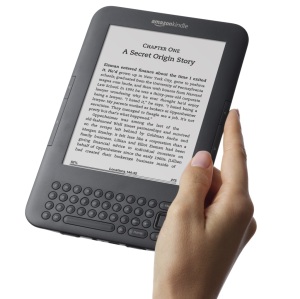With devices like the reading-specific Amazon Kindle and multi-purpose Apple iPad – both with e-book reading capabilities – growing in popularity, there has been a significant shift away from the purchase of physical books.
 I love books in their physical form. As a child, I loved visiting the library, religiously borrowing, reading, and returning books on a weekly basis. As an adult, I’m more likely to frequent bookstores than libraries simply due to the convenience and carefree nature afforded by purchasing a book from any bookstore without an obligation to read and return it by a pre-determined date. Enter the e-book, the ultimate in convenience and instant gratification, lower prices and weightless transport. Some things I dislike about e-books: you can’t share them, they’re only marginally less expensive, and they keep you stuck to a screen.
I love books in their physical form. As a child, I loved visiting the library, religiously borrowing, reading, and returning books on a weekly basis. As an adult, I’m more likely to frequent bookstores than libraries simply due to the convenience and carefree nature afforded by purchasing a book from any bookstore without an obligation to read and return it by a pre-determined date. Enter the e-book, the ultimate in convenience and instant gratification, lower prices and weightless transport. Some things I dislike about e-books: you can’t share them, they’re only marginally less expensive, and they keep you stuck to a screen.
 Nonetheless, with respect to environmental sustainability, e-books seem better for the environment. They don’t use any physical resources, such as paper, processing chemicals, and so on. However, we need to look at the fact that the e-book readers, whether it’s a Kindle, an iPad, an iPhone or other device have largely unsustainable components. In fact, the batteries in devices such as these are some of the worst environmental perpetrators around. Nonetheless, it needs to be acknowledged that not all of these negative environmental effects can be attributed solely to the reading of books for multi-purpose devices, such as the iPhone or the iPad. Additionally, applications for computers, both PC and Mac, are being developed. This will further demonstrate the benefit of e-books. For example, I would own my iPhone and MacBook whether or not I had the Kindle e-book reader application; consequently, I wouldn’t attribute any of the negative environmental impact of the battery to books.
Nonetheless, with respect to environmental sustainability, e-books seem better for the environment. They don’t use any physical resources, such as paper, processing chemicals, and so on. However, we need to look at the fact that the e-book readers, whether it’s a Kindle, an iPad, an iPhone or other device have largely unsustainable components. In fact, the batteries in devices such as these are some of the worst environmental perpetrators around. Nonetheless, it needs to be acknowledged that not all of these negative environmental effects can be attributed solely to the reading of books for multi-purpose devices, such as the iPhone or the iPad. Additionally, applications for computers, both PC and Mac, are being developed. This will further demonstrate the benefit of e-books. For example, I would own my iPhone and MacBook whether or not I had the Kindle e-book reader application; consequently, I wouldn’t attribute any of the negative environmental impact of the battery to books.
 As an e-book reader, I am thrilled to see new services being introduced that will further reduce the costs of purchasing e-books. Rather than buying every e-book, companies such as Amazon are introducing e-book rental systems. There is a lot of controversy currently facing this concept, particularly centered on the legality and fairness of such rental systems. Nonetheless, I believe it is a step in the right direction that effectively targets one of the biggest flaws of e-books: a lack of share-ability. I think this could be an especially large market for textbooks, as students are increasingly reluctant to purchase the expensive materials. Similarly, this will ultimately have increased positive implications on the environment, as fewer print books are produced.
As an e-book reader, I am thrilled to see new services being introduced that will further reduce the costs of purchasing e-books. Rather than buying every e-book, companies such as Amazon are introducing e-book rental systems. There is a lot of controversy currently facing this concept, particularly centered on the legality and fairness of such rental systems. Nonetheless, I believe it is a step in the right direction that effectively targets one of the biggest flaws of e-books: a lack of share-ability. I think this could be an especially large market for textbooks, as students are increasingly reluctant to purchase the expensive materials. Similarly, this will ultimately have increased positive implications on the environment, as fewer print books are produced.
There is something innately soothing in figuratively disappearing into the pages of a book. The weight of the book. The feel of the pages. The distinct smell of books. This can’t ever be replicated by an e-book. But there is something equally gratifying about the one-touch access to literature afforded by an e-book. The convenience of on-the-go reading. The lower price. Personally, e-books don’t deliver the same magic, but they still offer an escape. I’m interested to see what the future holds!
